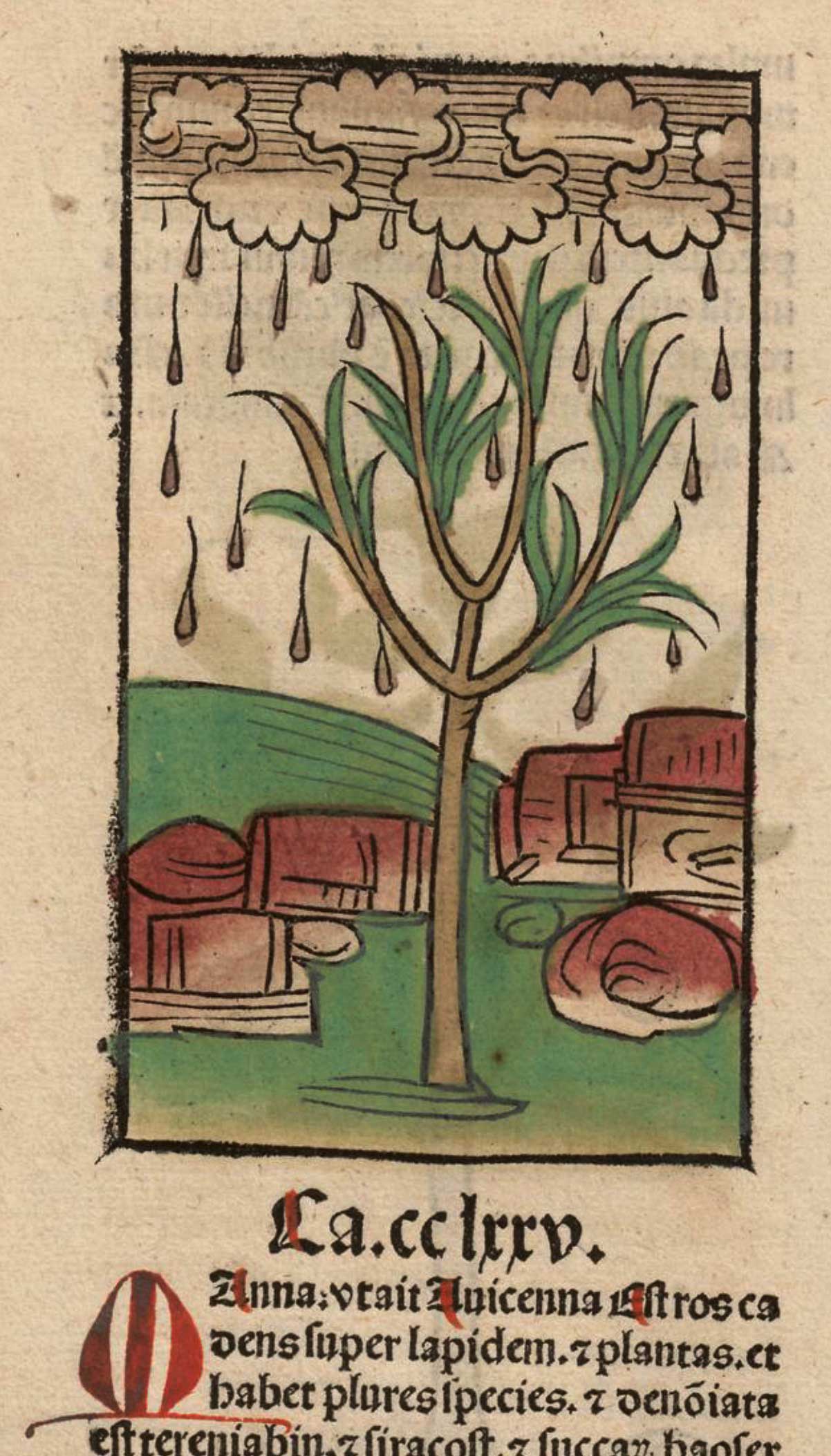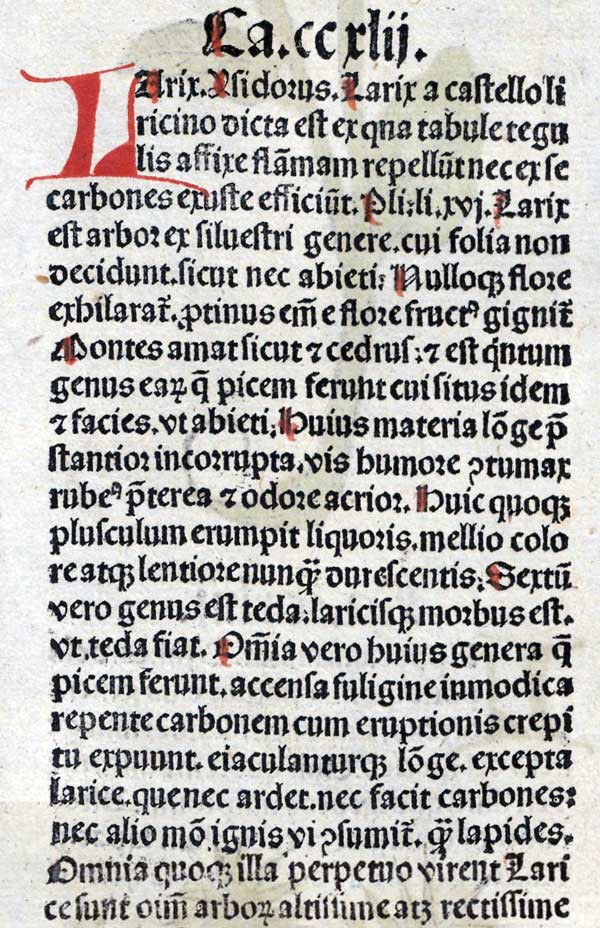Notes
Larix
Manna
Larix (text)
Melze
Meleses estants si frequentes au territoire d’Embrum & autout de Morienne, ne donneront despense à recouurer. Elles ont leurs semences plus petites que Cyprés, tant en la pommette que au noyau, toutesfois chasque chartée sur le lieu, qui l’entreprendoit, ne cousteroit pas un sou. C’est sur celuy dont la Manne est cueillie, & la grosse Terebenthine & l’Agaric aussi, & dont l’arbre est autant frequent es montaignes des Grisons, nommez en Latin Theti, qu’il fut onc, & es mesmes endroicts dont Tibere Empereur en feit apporter à Rome pour refaire le pont Naumachiarius, qui auoit esté bruslé.
manna
On appelait manne une liqueur blanche et de saveur sucrée qui se déposait sur les feuilles de certains arbustes. On la dénommait mel aerium parce que le goût en rappelait celui du miel et aussi parce qu’elle avait une origine analogue à celle du miel qui dans les idées du temps était récolté, et non fabriqué, par les abeilles. Cf. Gilson, op. cit., p. 87. Il s’agit ici de la manne, dite de Briançon, de qualité médiocre et qui exsude des feuilles du mélèze, Larix europæa. (Delaunay)
manna
Pour la manna (sorte de liqueur végétale, qui n’a rien à faire avec la manne des Isrëlites) cf., à part le livre de S. Champier. Pline, XXXVI, 19.
manne
Il ne s’agit pas de la manne biblique, mais du liquide sucré qui se dépose au printemps sur les feuilles ds certains arbres, et qu’on appelle miélat.
manne
Le terme est à prendre dans son sens botanique, pour désigner le sac qui s’écoule de certains végétaux comme les frênes ou les mélèzes.
manna
manna. Also monna, manne, mana.
[adopted from late Latin manna, adopted from Hellenistic Greek manna (? through Aramaic manna) Hebrew man (whence Greek man, Latin man, occurring more frequently than the longer form in the LXX and Vulgate O. T. G. Ebers (Durch Gosen zum Sinai), gives plausible reasons for believing that the Ancient Egyptian mannu denoted the exudation of Tamarix gallica. As the Arabic mann has the same sense, it seems possible that the Heb. word may represent the name anciently current in the Sinaitic wilderness for this natural product, which in many respects agrees with the description of the miraculous manna, and which is still locally regarded as a dew falling from the sky.
The etymological tradition or conjecture preserved in Exodus xvi. 15 represents the word as having originated from the question man hu? `what is it’ (in Aramaic or supposed archaic Heb.), which grammatically admits of being interpreted `It is man’. (Cf. the Vulgate, l. c.: Dixerunt ad invicem: Manhu, quod interpretatur, `quid est hoc?’)
The word has been adopted in most versions of the Bible, and appears in figurative uses in the literature of most of the countries of Christendom.
Whether the Greek manna, Latin manna, meaning a grain of frankincense, is connected with this word is uncertain, though an oriental origin for it is probable.]
Biblical and allusive uses. The substance miraculously supplied as food to the Children of Israel during their progress through the Wilderness. (See Exodus xvi.)
C. 897 K. Alfred Gregory’s Past. C. xvii. 124 And eac sceal bion on ðæm breostum ðæs monnan swetnes.
C. 1000 Ælfric Exod. xvi. 31 And nemdon þone mete Manna.
C. 1175 Lamb Homer 141 Sunnedei god sende manna from houene.
C. 1200 Trin. Coll. Homer 99 He let hem reine manne to biliue and gef hem bred of heuene.
C. 1330 Assump. Virg. (B.M. MS.) 768-9 Thei ouerturned þat ilke stone; Bodi þei founde þer none; But þei sawe in þat stede þana Liand as it were a mana. That manna bitokned hure clene lyf.
C. 1400 Maundev. (Roxb.) iv. 12 In þe toumbe of sayne Iohn men may fynd na thyng bot manna.
C. 1586 Countess Pembroke Psalms lxxviii. x, He… bade the cloudes ambrosian manna rain.
1651 C. Cartwright Cert. Relig. i. 124 The Apostle there calleth Manna spirituall meat, yet was Manna a materiall thing.
In Pharmacy, etc.: A sweet pale yellow or whitish concrete juice obtained from incisions in the bark of the Manna-ash, Fraxinus Ornus, chiefly in Calabria and Sicily; used in medicine as a gentle laxative. Also, a similar exudation obtained from other plants.
C. 1400 Lanfranc’s Science of cirurgie 182 Cole hem, & resolue þeron cassia fistula., thamarindorum, manne ana ss., & boile hem a litil togidere.
1533 Sir Thomas Elyot The castel of helth (1541) 58 Pourgers of Choler:… Manna vi drammes at the leaste, and soo to xxv, in the brothe of a henne or capon.
1543 Traheron Vigo’s Chirurg., Interpr. Strange Words, Manna is a dewe thicked, and fallynge in certayne places vpon trees,… and vsed for purgations.
1660 F. Brooke tr. Le Blanc’s Trav. 4 Upon the Mount Libanus… you may find the Manna, or Celestial dew, which I… took for snow.
manna
A grain (of frankincense); frankincense in grains. Obsolete [Strictly another word: adopted from Greek manna, Latin manna.]
1601 Philemon Holland Pliny’s History of the world, commonly called the Natural historie
I. 367 As for the small crums or fragments [of incense] which fall off by shaking, we called Manna, (i. Thuris).
1753 Ephriam Chambers Cyclopædia; or, an universal dictionary of arts and sciences, Supplement, Manna Thuris, the Manna of Frankincense, a term used by the ancient physicians to express such small pieces of frankincense… as broke off… in carriage.


